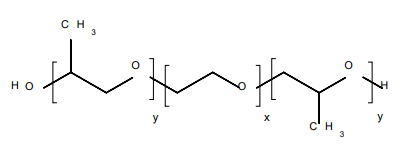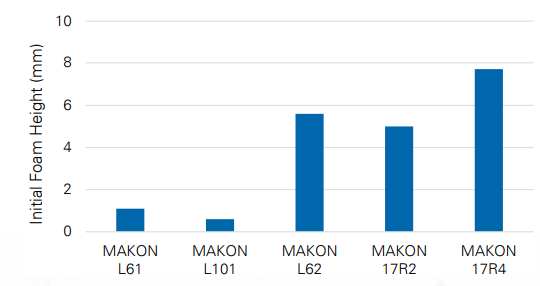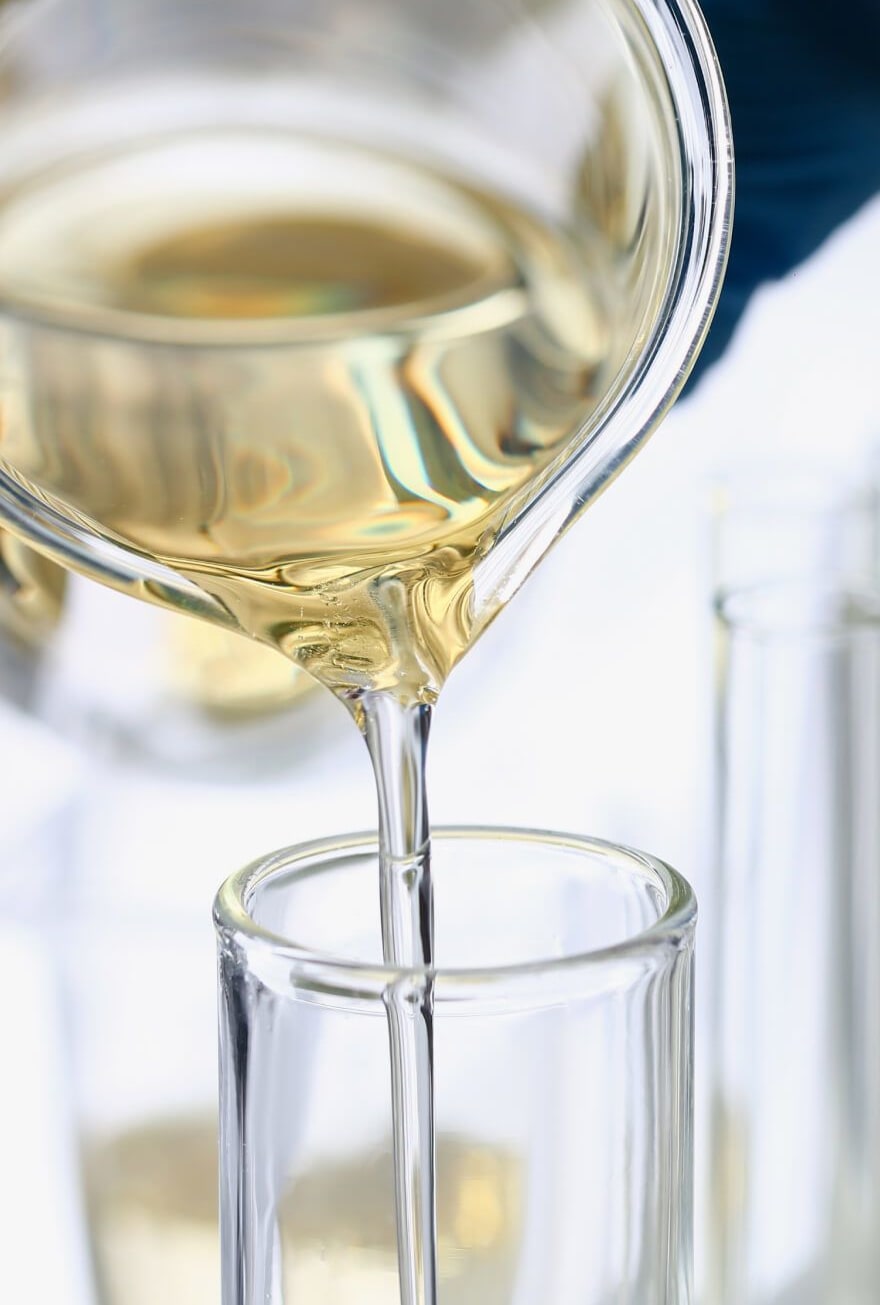Knowde Enhanced TDS
Identification & Functionality
- Chemical Name
- CASE Ingredients Functions
- Cleaning Ingredients Functions
- Fluids & Lubricants Functions
- CAS No.
- 9003-11-6
- EC No.
- 618-355-0
- Technologies
- Product Families
- Chemical Structure

- Surfactant Type
Nonionic.
Features & Benefits
- Labeling Claims
- HII Features
- Biodegradability
Publically available data shows that this type of product to be inherently biodegradable.
- Product Benefits
- Preservative Free
- EO/PO Block Copolymers
EO-PO-EO block copolymers are best used as individual low-foam surfactants when the EO content is lower, such as MAKON L61 and MAKON L101. Figure 3 shows Stepan’s EO/PO block copolymers that generate less than 1 cm of foam. PO-EO-PO reverse block copolymers, such as MAKON 17R2 and MAKON 17R4, are good foam controllers in the presence of other foaming sources. Reverse block copolymers also create a destabilization of foam structure (Figure 4) and can enhance foam break.
Figure 3: Foamability

Method: Spinning method with Dynamic Foam Analyzer (6,000 rpm, 25 seconds), 0.05 wt% surfactant in deionized water at 25°C.
Applications & Uses
- Applications
- Fluids & Lubricants Type
- Fluids & Lubricants End Use
- Home Care Applications
- I&I Cleaning Applications
- Industrial Additives End Use
- Applications
MAKON 17R2 is a nonionic reverse EO/PO block copolymer that exhibits fast-breaking, low foaming and defoaming properties. MAKON 17R2 can be used in a variety of markets including Industrial, Institutional, Pulp and Paper, Textiles, and Paints and Coatings. Applications for best fit are metalworking fluids, defoaming, dispersants, industrial lubricants, plasticizers, pulp and paper processing, rinse aids, and textile processing. MAKON 17R2 is a low ash product.
Properties
- Physical Form
- Appearance
- Clear liquid
- Typical Properties
| Value | Units | Test Method / Conditions | |
| pH (in 2.5% Aqueous) | 6.5 | — | — |
| Actives Content | 100 | % | — |
| Water Content | max. 0.2 | % | — |
| HLB | 6 | — | — |
| Color | max. 80 | — | Apha Scale |
| Average Molecular Weight | 2150 | g/mol | — |
| Hydroxyl Value | 52 | mg KOH/g | — |
| Cloud Point (in 10% Aqueous) | 26 | °C | — |
| Cloud Point (in 1% Aqueous) | 35 | °C | — |
| Pour Point | -39 | °C | — |
| Flash Point | min. 94 | °C | — |
| Viscosity (at 25°C (77 °F) / 38°C (100 °F)) | 351 / 169 | cPs | — |
| Density (at 25°C, 77°F) | 1.03 | g/ml | — |
| Density (at 38°C) | 1.02 | g/ml | — |
| Surface Tension (in 0.1% Aqueous) | 43 | dynes/cm | — |
| Interfacial Tension with Light Mineral Oil (in 0.1% Aqueous) | 15.1 | dynes/cm | — |
| Draves Wetting (in 0.1% Aqueous, at 25°C, 77 °F) | min. 90 | sec | — |
| Foam Height (0.1% Aqueous, Initial / 5 min, mm, at 25 °C, 77 °F) | 0 / 0 | mm | — |
| Foam Height (0.1% Aqueous, Initial / 5 min, mm, at 25 °C, 77 °F) | 23 / 2 | mm | — |
| Foam Height (0.1% Aqueous, Initial / 5 min, mm, at 50 °C, 122 °F) | 0 / 0 | mm | — |
| Solubility in Water (at 25 °C, 77 °F) | min. 10 | wt% | — |
Regulatory & Compliance
- Certifications & Compliance
- Chemical Inventories
- Clearances
The international inventories (country clearances) of MAKON 17R2 can be found in Section 15 of the Safety Data Sheet (SDS). It is the responsibility of the formulator to review the chemical control regulations for each country where the end product is intended to be sold or used.
Packaging & Availability
- Packaging Type
- Standard Packaging
MAKON 17R2 is available in drums, totes, and bulk quantities.
Storage & Handling
- Storage & Handling
Normal safety precautions (i.e., gloves and safety goggles) should be employed when handling MAKON 17R2. Contact with eyes, nose or prolonged contact with skin should be avoided. Wash thoroughly after handling MAKON 17R2. Product temperatures over 122°F (50°C) are not recommended.
Non-Bulk Storage Recommendations
MAKON 17R2 should be stored in closed containers and kept in a cool, dry place away from incompatible materials (see Section 10 of the SDS). If material is frozen, it may be fluidized by warming with a drum heater or in a steam room. Drums should be vented prior to heating to avoid excessive pressure build up.
Bulk Storage Recommendations
MAKON 17R2 should be stored in vessels of 316 stainless steel, but carbon steel is adequate assuming effective moisture exclusion. Elevated storage temperature may be desirable to maintain ease of pumping.

